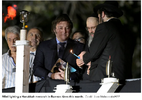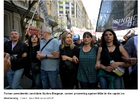On December 10, Argentina made history. The new president sworn in that day, Javier Milei, leads a far-right, libertarian party that aims to shrink the state and promote free-market economics.
He's often compared to
former Brazilian President Jair Bolsonaro and
Hungarian Prime Minister Viktor Orbán – both were at his inauguration – but there's another politician he praises:
Benjamin Netanyahu and his hard-right government.
In recent weeks, Milei seems to be taking his fascination with Israel and the Jews a step forward. He has said he is studying
the Torah and is considering converting to Judaism – and is reportedly planning to appoint his Orthodox rabbi-adviser, Axel Wahnish, as the next ambassador to Israel.
Milei's presidential campaign stressed the importance of a meritocracy in public jobs. But nominating a rabbi who taught him Torah and helped him raise campaign funds shows that the new president employs the old practice of tapping friends and followers.
It also reflects a lack of understanding of the Jewish community in both Argentina and Israel, where Orthodox Jews are in the minority. Argentina has the biggest Jewish community in Latin America and one of the largest in the world. Most people in the community of around 200,000 people are secular,
Reform or Conservative.
 A friend of Israel?
A friend of Israel?
The first two weeks of Milei's government have set off an upheaval. Last week, following the first demonstration against his economic plan, he issued an executive order overturning 300 laws approved by Congress in recent decades.
These laws touch on issues including the right to protest, price controls for medicine and food, and the whole nature of the health care system. Opposition parties want to
overturn the order, while middle-class people spontaneously took to the streets of Buenos Aires and other cities, with the trade unions threatening demonstrations.
In other words, Milei has boldly challenged state institutions and the entire political system. He told a journalist who supports his government: "Oh, there's gonna be more coming."
A week before these developments, Milei's government announced its first drastic cut in public spending including the freezing of university budgets, a new devaluation of the currency and rises in gas and electricity prices. The rises will particularly be important in March when the autumn starts.
A few hours later, Milei attended a
Hanukkah event organized by the
Chabad Hasidic movement. He sat next to
Argentine-Jewish real-estate mogul Eduardo Elsztain and gave a short speech in which he compared his victory to the spirit of the holiday.
 The new government's inner circle includes leading members of the Jewish establishment. Real-estate mogul Eduardo Elsztain is a known supporter, and media mogul Gerardo Werthein is the newly appointed ambassador to the United States.
The new government's inner circle includes leading members of the Jewish establishment. Real-estate mogul Eduardo Elsztain is a known supporter, and media mogul Gerardo Werthein is the newly appointed ambassador to the United States.
Two days before, at the end of his inaugural address, Milei had said, "I remember when, two years ago, someone told me in an interview that I wouldn't be able to do much because my party had just two representatives in Congress. And I also remember that my answer back then was a quote from Maccabees 3:19, the one that says: 'It is not on the size of the army that victory in battle depends, but strength comes from Heaven.'"
This Hanukkah-related quote has become his government's mantra.
The night before his inauguration, Milei attended a ceremony for the third night of Hanukkah alongside relatives of Argentine Israelis kidnapped by
Hamas on October 7. Israeli Foreign Minister Eli Cohen attended and in a tweet compared Milei's first name to the Hebrew word
haver (friend), saying that the new president is a friend of Israel. Cohen also lauded the pledge to move the Argentine Embassy from Tel Aviv suburb Herzliya to Jerusalem.
The new government's inner circle includes leading members of the Jewish establishment. For example, in addition to Elsztain's support, media mogul Gerardo Werthein is the new ambassador to the United States. Both accompanied Milei on his recent trip to the grave of
Lubavitcher Rebbe Menachem Mendel Schneerson in New York.
 The new attorney general is Rodolfo Barra, a former judge and minister who was forced to resign in 1996 when it was discovered he belonged to the neo-Nazi group Tacuara.
The new attorney general is Rodolfo Barra, a former judge and minister who was forced to resign in 1996 when it was discovered he belonged to the neo-Nazi group Tacuara.
But the new government's inner circle is also diverse. The new attorney general is
Rodolfo Barra, a former judge and minister who was forced to resign in 1996 when it was discovered he belonged to the neo-Nazi group Tacuara. In the '60s, this outfit led attacks on synagogues, blaming the Jews for the May 1960 abduction of
Nazi war criminal Adolf Eichmann by the Mossad.
The nomination of Barra as attorney general gave a chance for the Jewish community to show its diversity. When the news was announced early this month, progressive groups such as Amós and Meretz and conservative groups like the newly formed Argentine Forum against Antisemitism asked Milei to change his mind. They didn't succeed, and Barra has since written an op-ed
comparing the attributes of a president to those of a king.
On the other hand, the umbrella organization of Jewish communities, DAIA, said that Barra had apologized privately to it 30 years ago. DAIA's board is made up of secular Jews with right-wing views, whereas Orthodox Jews govern the mutual-aid association, AMIA, despite the secular, Reform and Conservative majority in the overall community.
Future scapegoats?
More than half of Argentina's Jews are not affiliated with any Jewish institution and express their Jewishness by other means, whether by attending High Holiday services, hosting Shabbat meals or connecting to their roots through food, culture or even by hosting nonreligious Shabbat dinners, a new trend imported from New York. The old joke of two Jews and three opinions seems to apply to Argentina.
The Jewish presence in modern Argentina began in the late 19th century with a migration mainly from Eastern Europe as other Jews were heading for North America. Though Jews were well integrated into Argentine society, during the first half of the 20th century the country's establishment considered Jews an undesirable Other. Jews' access to top posts in the state administration or military was limited, and they were expected to leave behind their Jewish traditions and become "full Argentines."

Contrary to commonly held assumptions, during President Juan Domingo Perón's main term from 1946 to 1955, Jewish Argentines were fully welcomed into society. Perón was the first Latin American leader to recognize Israel and the only one so far to nominate a Jew as ambassador to the country, Pablo Manguel.
After the coup that ousted Perón in 1955, antisemitism in Argentina surged. In the '60s, on the back of Eichmann's kidnapping, Tacuara physically attacked synagogues, Jewish clubs and individual Jews.
Later, the right-wing dictatorship of 1976 to 1983 was particularly cruel to Argentine Jews despite its diplomatic and commercial ties to Israel, which included arms sales to Argentina.
The reestablishment of democracy in 1983 was a pivotal moment for all Argentines. Members of the Jewish community became ministers under the presidencies of Raúl Alfonsín, Carlos Menem, Néstor Kirchner, Cristina Kirchner and Mauricio Macri. The bombing of the Israeli Embassy in 1992 and of the Jewish community center in 1994 – with Iran believed to be behind both – helped
fracture the community, and the rifts are wider than ever 30 years later.
Amid the country's political tensions and economic problems, some Jews, most of them associated with Chabad and other Orthodox branches, laud Milei's efforts to get closer to the Jewish establishment and Netanyahu's government. But many Jews are worried they will become the scapegoat if the economic crisis deepens and Argentines begin linking Milei to the Jewish community.
In fact, last week, three Jewish institutions – Chabad,
the Conservative synagogue Amijai, and the headquarters of the Reform Movement, the Libertad synagogue – received threats that the police are looking into.
Prof. Raanan Rein is the Elias Sourasky professor of Latin American and Spanish history and a former vice president of Tel Aviv University. Pablo Mendez Shiff is a journalist and Ph.D. student in history at Tel Aviv University
Milei's very serious public admission on Mirtha Legrand's show that he is negotiating with Elon Musk and the US government to appropriate our lithium, and that they are demanding "a legal framework" that will benefit them. This shows why the Land Law was derogated through the DNU, and that the libertarian regime is working on handing over our strategic resources to foreigners. An impeachment against Milei and his acolytes is becoming increasingly well-founded.
Opinions By
Dave Emory @Spitfirelist
Web site and blog of anti-fascist researcher and radio personality Dave Emory.

spitfirelist.com
Posted⋅ December 26, 2019
Snip:
Introduction: These programs highlight features of an apparent coup d’etat in Bolivia, emphasizing the individuals and institutions figuring in the coup itself, as well as the underlying dynamic of the development of Bolivia’s enormous lithium reserves. Central to the discussion is the fact that lithium is essential for the development of electric car batteries and that technology is important to any successful “Greening” of the global economy.
Fascists from Latin America and Europe networked with transnational corporate elements and some U.S. intelligence cut-outs to
oust Evo Morales and his government.
Although Morales had violated constitutional norms on term limits in order to extend his governance, his political agenda had greatly benefited Bolivia’s poor and its historically oppressed indigenous population, in particular. The country’s mineral wealth has been exploited by foreign companies and select members of the Bolivian elite to the detriment of much of the population.
Even the conservative
Financial Times has noted that Morales restructuring of the Bolivian economy–mineral extraction, in particular–has significantly improved the country’s economy and reduced poverty.
This element of discussion involves many subjects covered at length over the decades and featured in the archives:
Transcript Included
FTR #1104 This program was recorded in one, 60-minute segment.
FTR #1105 This program was recorded in one, 60-minute segment.













